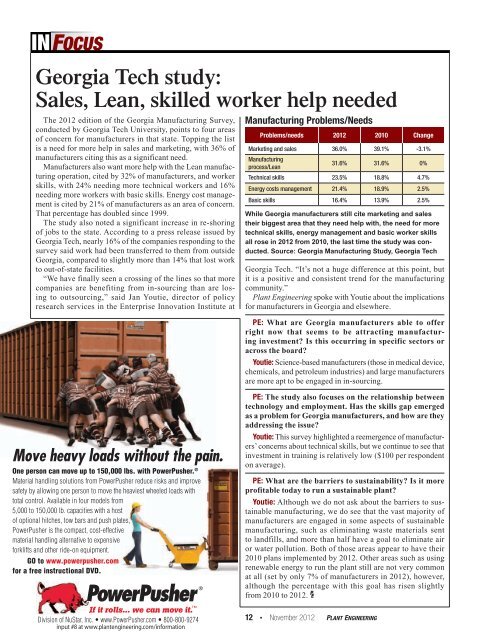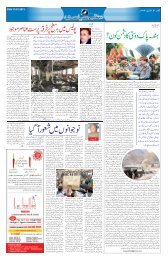2012 - PageSuite
2012 - PageSuite
2012 - PageSuite
Create successful ePaper yourself
Turn your PDF publications into a flip-book with our unique Google optimized e-Paper software.
INfOCUS<br />
Georgia Tech study:<br />
Sales, Lean, skilled worker help needed<br />
The <strong>2012</strong> edition of the Georgia Manufacturing Survey,<br />
conducted by Georgia Tech University, points to four areas<br />
of concern for manufacturers in that state. Topping the list<br />
is a need for more help in sales and marketing, with 36% of<br />
manufacturers citing this as a significant need.<br />
Manufacturers also want more help with the Lean manufacturing<br />
operation, cited by 32% of manufacturers, and worker<br />
skills, with 24% needing more technical workers and 16%<br />
needing more workers with basic skills. Energy cost management<br />
is cited by 21% of manufacturers as an area of concern.<br />
That percentage has doubled since 1999.<br />
The study also noted a significant increase in re-shoring<br />
of jobs to the state. According to a press release issued by<br />
Georgia Tech, nearly 16% of the companies responding to the<br />
survey said work had been transferred to them from outside<br />
Georgia, compared to slightly more than 14% that lost work<br />
to out-of-state facilities.<br />
“We have finally seen a crossing of the lines so that more<br />
companies are benefiting from in-sourcing than are losing<br />
to outsourcing,” said Jan Youtie, director of policy<br />
research services in the Enterprise Innovation Institute at<br />
Manufacturing Problems/Needs<br />
Problems/needs <strong>2012</strong> 2010 Change<br />
Marketing and sales 36.0% 39.1% -3.1%<br />
Manufacturing<br />
process/Lean<br />
31.6% 31.6% 0%<br />
Technical skills 23.5% 18.8% 4.7%<br />
Energy costs management 21.4% 18.9% 2.5%<br />
Basic skills 16.4% 13.9% 2.5%<br />
While Georgia manufacturers still cite marketing and sales<br />
their biggest area that they need help with, the need for more<br />
technical skills, energy management and basic worker skills<br />
all rose in <strong>2012</strong> from 2010, the last time the study was conducted.<br />
Source: Georgia Manufacturing Study, Georgia Tech<br />
Georgia Tech. “It’s not a huge difference at this point, but<br />
it is a positive and consistent trend for the manufacturing<br />
community.”<br />
Plant Engineering spoke with Youtie about the implications<br />
for manufacturers in Georgia and elsewhere.<br />
PE: What are Georgia manufacturers able to offer<br />
right now that seems to be attracting manufacturing<br />
investment Is this occurring in specific sectors or<br />
across the board<br />
Youtie: Science-based manufacturers (those in medical device,<br />
chemicals, and petroleum industries) and large manufacturers<br />
are more apt to be engaged in in-sourcing.<br />
Move heavy loads without the pain.<br />
One person can move up to 150,000 lbs. with PowerPusher. ®<br />
Material handling solutions from PowerPusher reduce risks and improve<br />
safety by allowing one person to move the heaviest wheeled loads with<br />
total control. Available in four models from<br />
5,000 to 150,000 lb. capacities with a host<br />
of optional hitches, tow bars and push plates,<br />
PowerPusher is the compact, cost-effective<br />
material handling alternative to expensive<br />
forklifts and other ride-on equipment.<br />
GO to www.powerpusher.com<br />
for a free instructional DVD.<br />
PowerPusher<br />
If it rolls... we can move it.<br />
Division of NuStar, Inc. • www.PowerPusher.com • 800-800-9274<br />
input #8 at www.plantengineering.com/information<br />
®<br />
PE: The study also focuses on the relationship between<br />
technology and employment. Has the skills gap emerged<br />
as a problem for Georgia manufacturers, and how are they<br />
addressing the issue<br />
Youtie: This survey highlighted a reemergence of manufacturers’<br />
concerns about technical skills, but we continue to see that<br />
investment in training is relatively low ($100 per respondent<br />
on average).<br />
PE: What are the barriers to sustainability Is it more<br />
profitable today to run a sustainable plant<br />
Youtie: Although we do not ask about the barriers to sustainable<br />
manufacturing, we do see that the vast majority of<br />
manufacturers are engaged in some aspects of sustainable<br />
manufacturing, such as eliminating waste materials sent<br />
to landfills, and more than half have a goal to eliminate air<br />
or water pollution. Both of those areas appear to have their<br />
2010 plans implemented by <strong>2012</strong>. Other areas such as using<br />
renewable energy to run the plant still are not very common<br />
at all (set by only 7% of manufacturers in <strong>2012</strong>), however,<br />
although the percentage with this goal has risen slightly<br />
from 2010 to <strong>2012</strong>. P E<br />
12 • November <strong>2012</strong> plant engineering

















